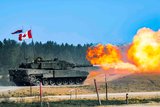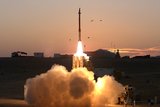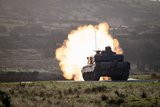Sweden to receive IRIS-T SLS SAM systems
Diehl Defence will deliver IRIS-T SLS surface-to-air missile (SAM) systems to the Swedish Defence Material Administration under a new contract announced on 11 March. When delivered, the system will be operated by the Swedish Army together with a new Command and Control (C2) system and modernised sensors.
The contract will see Diehl Defence supply new units comprising the IRIS-T missile, missile launching station and fire control system. The system will improve Sweden's national air defence capabilities, providing protection against air attacks from a large variety of threats including missiles, helicopters and aircraft. Following deployment, the mobile system allows fully automatic operation 24 hours a day.
IRIS-T SLS employs the standard IRIS-T air-to-air missile and is the short-range complement to the medium-range IRIS-T SLM ground-based air defence system of Diehl Defence. IRIS-T SLM is based on the SAM system development in Germany for national air defence.
Delivery of the first IRIS-T SLS systems is scheduled to commence in 2016.
More from Land Warfare
-
![Land forces review: Tanks, trucks and IFVs dominate but woes remain for Ajax]()
Land forces review: Tanks, trucks and IFVs dominate but woes remain for Ajax
This year has begun with main battle tanks taking the lead while orders for large logistics and support vehicles continued from last year. Additionally, two of the British Army’s most significant contracted vehicle programmes, Ajax reconnaissance vehicle and Challenger 3 tank, continued to make news in January.
-
![Canada looking to expedite purchase of armoured fighting vehicle and a new tank]()
Canada looking to expedite purchase of armoured fighting vehicle and a new tank
Canada is improving its Leopard main battle tank fleet but before this is fully completed, it is expected to begin looking for new vehicles.
-
![Layered protection: How air defence is adapting to rising drone and missile threats (podcast)]()
Layered protection: How air defence is adapting to rising drone and missile threats (podcast)
A surge in aerial threats – from advanced missiles to low-cost drones – is reshaping the way militaries approach air defence, driving demand for flexible, multi-layered solutions.
-
![UK agrees parallel development and production process for British Army Challenger 3]()
UK agrees parallel development and production process for British Army Challenger 3
In a bid to accelerate delivery of the British Army’s Challenger 3 main battle tank, which has just carried out its first crewed firings with the latest Rheinmetall 120mm L55A1 smoothbore gun, the UK has opted for an unconventional approach.
-
![Romania intensifies search for more tanks and could look beyond Abrams]()
Romania intensifies search for more tanks and could look beyond Abrams
Since signing a contract to purchase 54 M1A2 Abrams tanks last year, Romania has been looking into options to buy more tanks, but it could cast the net wider than Abrams with funding considerations potentially set to shape the outcome.






















